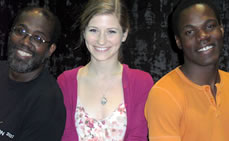Behind the Scenes: Auditions & Acting
By Lisa K. Winkler
 Getting off the elevator and entering the rehearsal studio — a maze of small, pastel-painted, mirrored rooms, complete with ballet barres — and seeing the young actors primping and pacing, perusing scripts and listening to music on their iPods, I was happy to be a guest, invited to observe auditions. I’d bid to spend a day with the casting director at the Shakespeare Theatre of New Jersey’s gala. Last year, I appeared once in the company’s production of “To Kill A Mockingbird” and wanted a different experience this time.
Getting off the elevator and entering the rehearsal studio — a maze of small, pastel-painted, mirrored rooms, complete with ballet barres — and seeing the young actors primping and pacing, perusing scripts and listening to music on their iPods, I was happy to be a guest, invited to observe auditions. I’d bid to spend a day with the casting director at the Shakespeare Theatre of New Jersey’s gala. Last year, I appeared once in the company’s production of “To Kill A Mockingbird” and wanted a different experience this time.
The casting director and play director were auditioning for “Oliver Twist” to be performed in September. The play, adapted by Neil Bartlett, combines Dickens’ language, 12 actors playing many roles and music representative of Victorian England. Each actor had a 10-minute slot to audition, sort of speed dating with a script. Two company members assisted as readers, assuming various roles as the script demanded. Immediately, I felt like a nervous stage mother, wanting each actor to do well.
The casting director assured me that after seeing a few, I’d recognize differences, and he was right. I could tell who had studied accents, had dressed for the role, who acted but wasn’t melodramatic, who understood the role and scene. I learned that even if an actor presented well, the directors had to consider the entire ensemble. There has to be a balance between equity and non-equity actors. The company has to fit together; everything is balanced, including height, weight and appearance.
Glancing at their resumes, I remarked at the various skills listed. Hand whistling, accents, musical instruments, and drivers’ licenses (good for films) among them. In the morning I watched about 20 auditions, two actors were asked to return for a callback the next day. One of the readers told me: “On average we go on 10 auditions a week. Success is great; failure is expected.”
I’d heard this sentiment expressed a week earlier when I interviewed the cast of Athol Fugard’s 1989 “My Children! My Africa!” at the Signature Theatre for Education Update. The play closed after a seven-week run, and the three actors were heading to different locations and projects. They shared how they got into acting and the role of theater in their lives.
The play, a story set in 1984 as apartheid begins to unravel, centers on a South African teacher and his students, a white woman and a black man, who meet during a debate competition. Generations and ideals clash as the teacher, Anela Myalatya, called “Mr. M,” sticks to traditional views.
For James A. Williams, the role as Mr. M wasn’t too far a stretch from what he does offstage. Directing a theater program for incarcerated youth in Minneapolis, he hopes to impart to others what his high school counselor did for him decades ago in St. Louis. “She told me, ‘I’m not going to give up on you even though you’ve given up on yourself.’ She handed me a stack of college applications and told me to sign them. College wasn’t a world I grew up in. People I knew got a job. They drove cabs. They worked for the steel mill, or Anheuser-Busch or McDonnell Douglas,” Williams said.
Allie Gallerani, who played the character Isabel Dyson, grew up in North Carolina watching musicals on television and participating in local children’s theater groups. She did her thesis at Northwestern on Athol Fugard, who met the actors during rehearsal of “My Children! My Africa!”
“He let us be ourselves. We didn’t want to disappoint him but felt so honored to have him around to answer our questions.” Gallerani said.
Like James A. Williams, Stephen Tyrone Williams (no relation), became an actor thanks to a high school drama teacher who convinced him to audition for the school musical. He sees many parallels between his character in the play, Thami Mbikwana, and himself. “We’re both students fighting against teachers who are trying to help us; we’re really fighting against ourselves,” he said.
Listening to them talk about their passion for acting, I remembered how I loved participating in my high school musicals, how my children loved theater at school, and how I infused drama in teaching whenever I could. I thought about the young people I met from this play and the ones I observed auditioning. Their passion for their art permeates the room.
PHOTO CAPTION: L-R: James A. Williams, Allie Gallerani and Stephen Tyrone Williams
